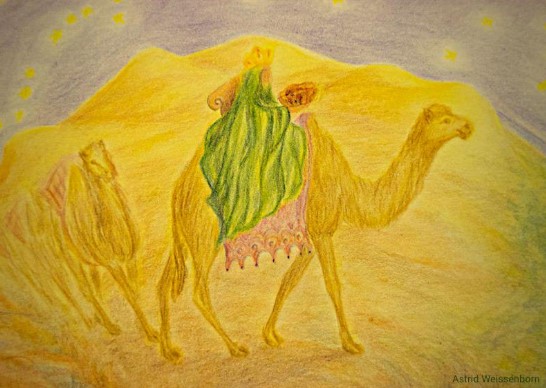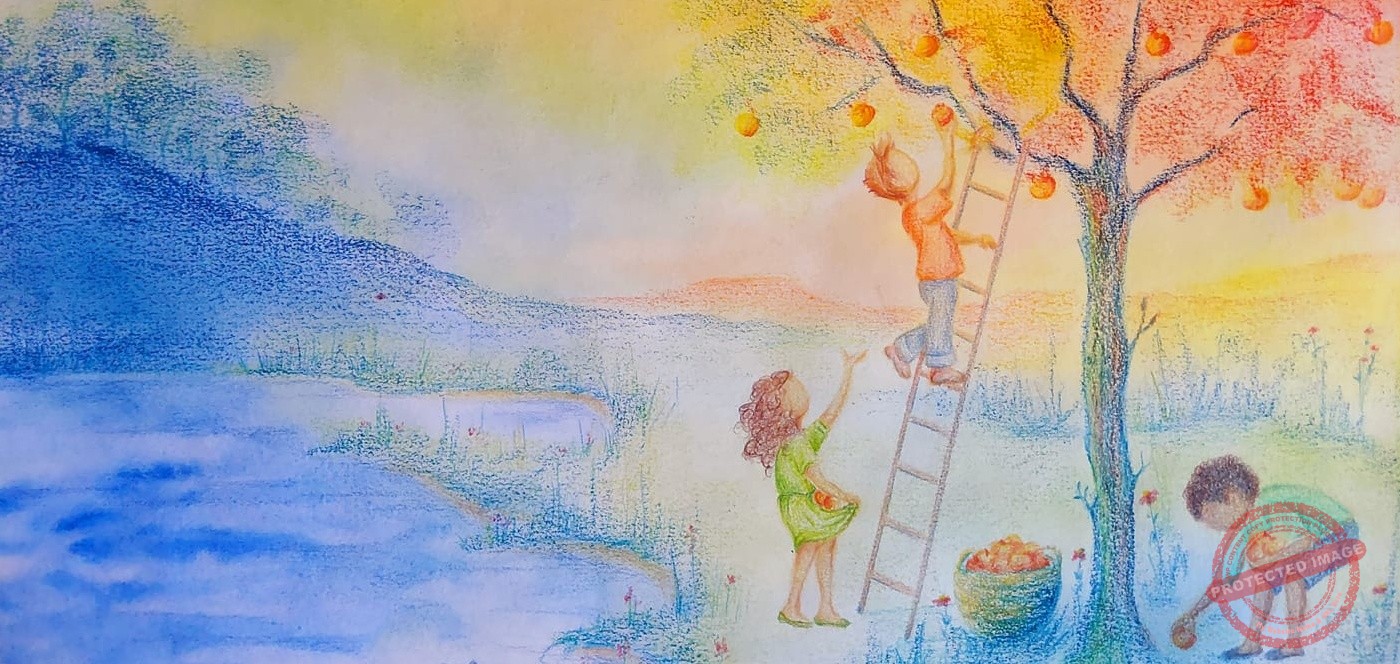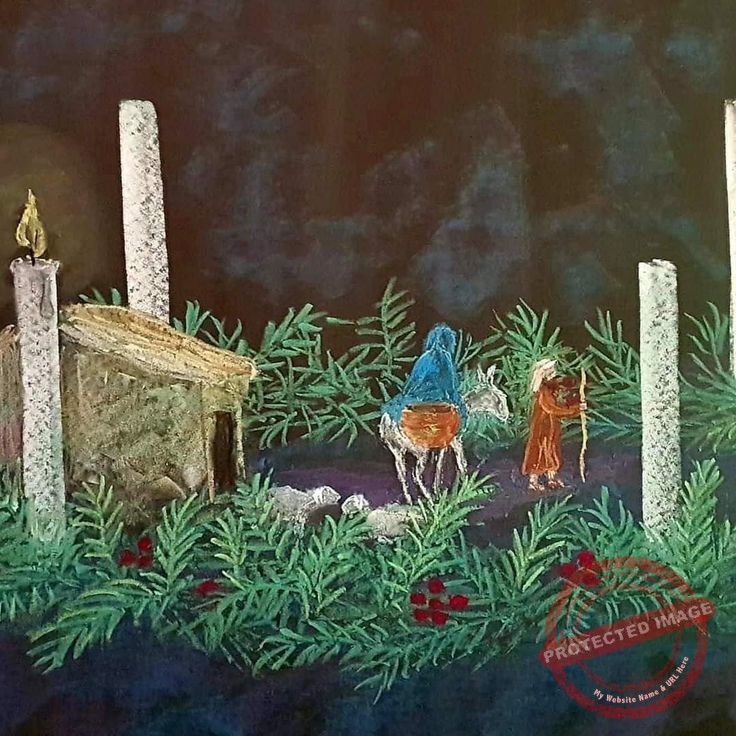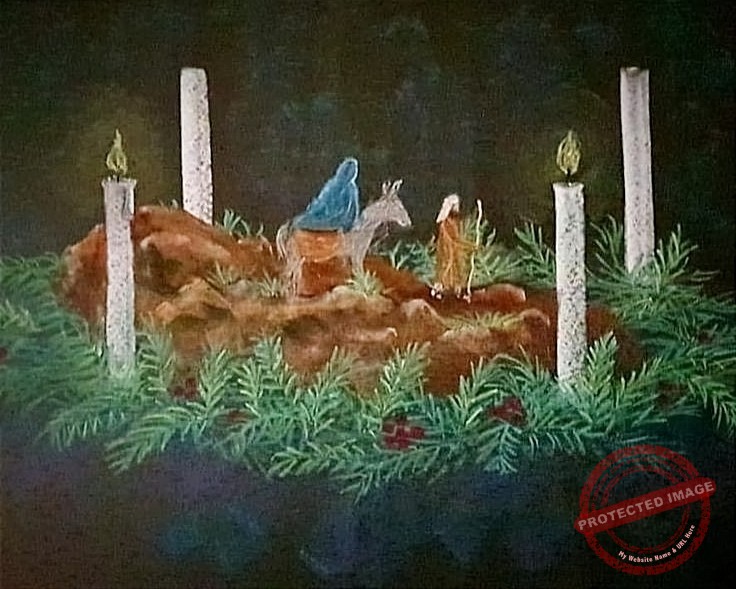[print-me target="body"]
by Jeanna Oterdahl
The north wind blew across the plain, sweeping the clouds of fine snow before it, driving their flakes through the air like blades. The river, which meandered through it, froze so that it merged with the land as one.
Through the gusts of wind the church bell could be heard faintly. The nuns of the abbey of São Miguel were ringing the bell because it was Christmas Eve, and its sound was so joyful that it was as if he knew that it heralded the most beautiful of days.
Along the snow-covered path that followed the course of the river, a lone hiker trudged along, his back hunched as if fighting the force of the wind; and whenever the sound of the bell reached his ears, he would smile evilly and quicken his pace.
“You've done a lot in your time, Stefan Vasilovich, but now I think you're going to outdo yourself,” he said aloud, and laughed again. “Until today, you were content to terrorize the people of the villages and make the roads dangerous. His name has acquired horrible fame, no doubt about it. The smallest child knows that there is nothing worse than going the way you walk. You are smart, you know how to walk in silence and you achieve the best things. The peasants hate you and regard you as a pest, because you steal their calves, set fire to farms and break into the hiding places of their money. But that is not enough: all this will be forgotten over the years. Tonight Vasilovich will perform the greatest feat of a robber, which will make him famous as a hero or as a saint.”
The wind hit his wild face in a razor-sharp hailstorm, but that was nothing to him. With his hat lowered on his forehead, he walked with difficulty, but without stopping. I could already see the lights of St. Michael's Abbey shining through the darkness and snowstorm.
When I was still a child, thought Stefan Vasilivich, I had the same stubborn character that I have now. For me, compassion and fragility made no sense.
“Look good!” – said my father once – “Someone will come along to tame him.”
“What an idea, Father! I've been hungry and cold, there is no prison that can hold me. I would like to find someone who can tame me.”
And Stefan Vasilivich laughed again with that satisfied, evil laugh, which was carried on the wind through the snow. As he got closer to the abbey, he slowed down and his eyes lit up.
When the Vespers prayer was over, the nuns went, in pairs, from the chapel to the refectory. Alone, far behind, walked the youngest of the sisters. She was small and slender and had big brown eyes hidden under her bonnet. Her eyes still reflected the glow of the chapel candles, and her lips moved softly as if she was still singing.
Sister Ecaterina was only fifteen years old; she was the little girl from the convent, the singing bird, and they all loved her. And because she was still a child, she was forgiven when she sometimes forgot her obligations. At that moment, she was so immersed in her own thoughts that she walked more slowly and forgot that she should follow the others.
She then stopped in the snow, right in the middle of the abbey courtyard. Her heart was so full of joy for the Child who had come into the world that night that she didn't even feel the biting cold of the snow that covered her light clothing and brushed her face.
Sister Ecaterina, with folded hands, prayed to God asking him to give her the opportunity to serve the Baby Jesus. Standing there, immersed in prayer, not noticing that the others had long since entered the heated refectory room, she was suddenly disturbed by a light knock on the convent's front door.
She forgot that it wasn't her job to open the door to strangers, and she ran over there. Her heart pounded, hoping that perhaps God had already heard her prayer and that, that very night, he was going to test her love for the Baby Jesus.
As I ran, I wondered who might be out there, perhaps a child or a very old man, because the beat seemed wobbly and weak. Without hesitation and without considering who she might be opening the entrance to, she removed the heavy bar and beckoned the man outside to enter.
If the little nun, with her big glowing eyes, knew that the man before her was Stefan Vasilovich, the murderer and thief she had heard so many times about in fear and horror, she would surely fall into the snow in terror, not daring to move or speak. . But how could Sister Ecaterina imagine that this old man with the gray beard and the wide-brimmed hat was not just an exhausted pilgrim? When he asked, in the name of God and Saint Michael, for a shelter over his head and a loaf of bread, she was just glad that God had heard her prayer so quickly. Her face filled with joy, she led the man into the refectory, where the nuns were seated around the long table.
“Sister,” said the abbess, who was sitting at the head, next to Elisabeth, the blind sister, “have you forgotten that today it is your turn to distribute the bread? Have you also forgotten that it is not your duty to open the door to strangers? Sister, sister, when will you finally be like the others?”
But the little sister Ecaterina, who was the daughter of a prince and the sister of a prince, knelt on the stone floor and asked forgiveness so humbly that the abbess did not have the courage to punish her.
After the sisters sang the hymn of thanksgiving, Sister Ecaterina distributed the fragrant fresh Christmas bread and gave the best piece to the gray-bearded pilgrim.
Stefan Vasilivich chuckled silently at the psalm and the simple meal, and his wicked heart rejoiced in anticipation. For he knew that the convent was rich in icons decked with gold and pearls, and possessed sacred vessels with jewels of many colours, though the nuns lived in great poverty and abstinence.
After dinner was finished and the hymn was sung, Sister Ecaterina asked permission to wash the pilgrim's feet, and the abbess was happy with her willingness to serve God.
But Stefan Vasilivich was not overjoyed to have played his part so well, and he glanced cautiously from one nun to the other, imagining their terror when the time came.
As she knelt on the cold stone floor and unlaced Stefan Vasilivich's boots, the prince's little daughter said:
"If you are indeed as pious as I believe you to be, the water in which I wash your feet will be purer and clearer than it is now," and her childish spirit rejoiced at her own words.
And, you see, after Sister Ecaterina had spent some time washing the pilgrim's feet with great care, as if she were carrying out an important task, the water really did get purer, as pure as if it had been taken from a fountain, and the little nun screamed out of joy.
But in Stefan Vasilivich's cruel heart, which only harbored bad feelings, an immense astonishment grew. What strange powers were there in that place? She thought it was time to pluck her white beard and throw away her pilgrim hat, but she couldn't even get up. He sat still, transfixed, looking at the clear water that had kept its purity and made his feet whiter than snow.
Sister Ecaterina approached the abbess, knelt in front of her chair and, trembling with joy, said: “Pious Mother, our guest is indeed a very holy man. Allow me to wash our poor blind sister's eyes with the water in which I washed the pilgrim's feet. Perhaps God works a miracle through the pilgrim's piety.”
The abbess gave her permission, and Sister Ecaterina, full of hope, filled a bowl with water and went to the blind nun. Sister Elizabeth hadn't seen the light of day in thirty years and shook her head sadly. She had prayed so hard to receive the gift of sight back, that she now peacefully accepted her total darkness, and no longer rebelled against it.
“Dear child,” she said, “it is God's will that I live in the dark until I finally enter the eternal light, where even the blind can see.”
"Sister Elizabeth," pleaded the little nun, "just let me try."
And the blind nun smiled, for no one could contradict Sister Ecaterina.
And, lo and behold, when the first drops of water ran over those blind eyes, the veil that had closed them for thirty years was removed.
The more the little nun washed them, the clearer everything became to Sister Elizabeth, until finally she stood up and looked around with her hands folded and her eyes beaming with seeing. And all the sisters who were in the refectory began to sing a hymn of praise, while Ecaterina, the prince's daughter, threw herself on her knees before the pilgrim and kissed his feet with tears.
Then the stranger jumped up and screamed as loud as a man filled with anguish in his soul.
“Who are you, O God?” – he exclaimed, plucking his gray beard and throwing away his pilgrim's cloak – “Who art thou, O Almighty, that hast conquered me? You nuns know that I am Stefan Vasilivich, the thief and murderer. I never believed in God or the Devil. I filled cities and villages with terror. No blow could bring me down, no prison could keep me inside. Know, sisters, that I have come here tonight to steal and kill.”
And he screamed again as if he was in the greatest pain.
“Who art Thou, O Almighty? Sticks and blows only strengthened me. No torture has bent me. But tonight You hit me with the scourge of mildness, as if You worked a miracle through this girl's faith. Glory to your name for all eternity!”
When Stefan Vasilovich spoke these words, he fell to his knees. All the sisters began to sing a hymn of praise to God, and Sister Ecaterina's voice was louder than all the others.
***







